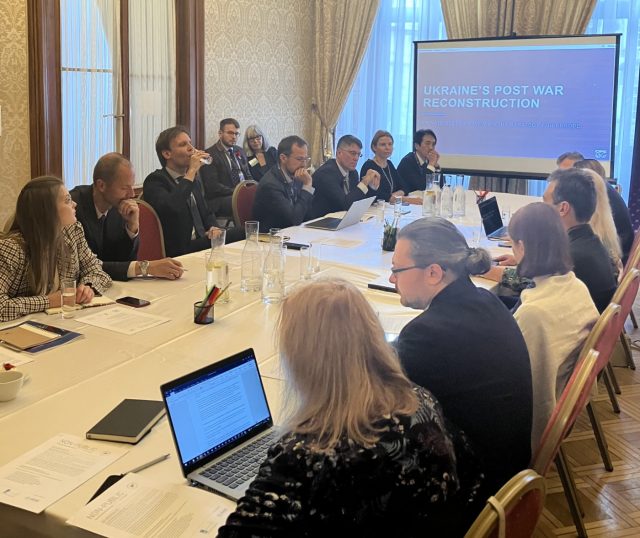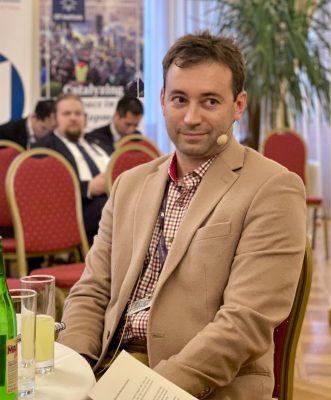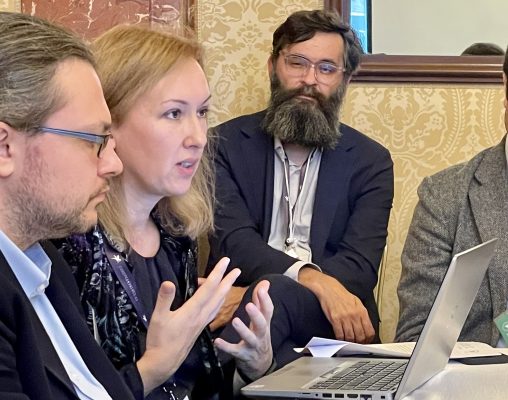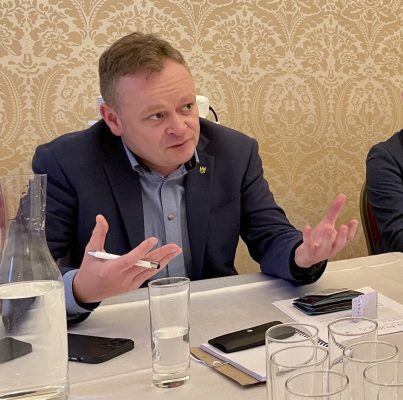There is no need to wait for the war to end to reconstruct Ukraine. This was the key takeaway of a panel, organized by CIPE, within the European Values Summit in November 2022.

Experts from the private sector in Ukraine and abroad discussed the prospect of cooperation with the European Union to restart the Ukrainian economy. Speakers highlighted the significant losses that the Ukrainian economy has suffered as a result of the full-scale Russian invasion, and asserted that cooperation should be immediate and extensive.
Since February 24, 33.8% of enterprises in Ukraine have completely or almost completely ceased their operations. Out of this group, 63% of enterprises in the east and 39% in the south do not see opportunities to resume their activities this year. As of September, total direct losses to SMEs since the war began are estimated at $87 billion USD. Exporters face limited opportunities to carry out their operations due to port blockades, according to a survey conducted by the Entrepreneurship and Export Promotion Office in Ukraine.
Ukraine is fighting a war for all of us in the western democratic world and is already paying a huge human and economic price.
More than 10 million Ukrainians (~25% of the population) left their homes because of the conflict, and 3 to 5 million remain abroad. At least 3 million Ukrainians have lost their jobs, and the unemployment rate is now estimated to have exceeded 30%. Furthermore, experts estimate that wages have decreased by 30-60% in various spheres of economic activity that reflect the overall economy and represent a wide problem.

According to Ilya Zaslavskiy, CIPE Program Officer for Eastern Europe, there is no need to wait for the cessation of military operations in order to address their economic consequences. Zaslavskiy states, “Ukraine is fighting a war for all of us in the western democratic world and is already paying a huge human and economic price. Investment into the Ukrainian economy and its reconstruction should be considered an investment into the West’s own security and democracy, not just Ukraine’s.”
CIPE is working on promoting Ukraine’s economic revival through a series of activities inside and outside the country. Our focus is on consolidating the voices of the private sector and providing platforms for communication with decision-makers at the international level.
The CIPE team has received and developed several proposals from the Ukrainian private sector on Ukraine’s recovery and reconstruction and articulated them to the European business community during the All-Ukrainian Business Forum. The forum was organized by Ukraine’s National Business Coalition and facilitated by CIPE and the Ukrainian Business Council in Kyiv in October this year, taking place despite Russian air attacks on the city. Priority tasks and sectors for intervention were presented at the roundtable discussion. This discussion was moderated by Oksana Oleinikova, CIPE Ukraine Country Director. Ater the conclusion of the forum, CIPE refined and passed along key ideas from the event at the European Values Summit. CIPE brought in experts and representatives of the Ukrainian private sector to communicate these ideas directly. The CIPE team and Ukrainian experts have established great new connections with Czech and EU counterparts and will continue to collect and convey messages from the Ukrainian private sector to relevant audiences in Europe, including officials and potential investors.
The main challenge the Ukrainian private sector faces is the impossibility of taking a break during the ongoing war. Business cannot stop, it’s a matter of survival.
To address short-term priorities, the following steps were proposed:
- Energy — Ukraine is struggling without electricity and stable internet access. There is a need for reasonable options to ensure energy independence, such as alternative sources and microgeneration, as well as the provision of energy-saving buildings to save heat.
- Access to markets (supply chains) — Despite the expansion of quotas for Ukrainian exporters, many products are stuck at EU customs. Additional control points on the borders with Europe, as well as transfer terminals, wagons, and warehouses are needed.
- Infrastructure — Critical residential and communal infrastructure have been destroyed during the conflict. At this stage, the EU can provide for the design and production of goods needed for reconstruction (glass, insulation materials, etc).
Additionally, the following steps were proposed to address long-term priorities:
- Reparations — Compensating Ukrainian companies for damages resulting from Russian aggression, using funds derived from confiscated Russian assets.
- The labor market — Encouraging the return of the millions of Ukrainians who have gone abroad by creating safe jobs and integrating them back into economic processes.
- EU standards — Incorporating European standards and anti-corruption measures into Ukrainian legislation and enforcing them.

“The main challenge the Ukrainian private sector faces is the impossibility of taking a break during the ongoing war. Business cannot stop, it’s a matter of survival. If you come to Ukraine, you will be surprised by a strong desire the private sector has to maintain the usual rhythm of business activity. We are consolidating efforts to help our country go through the hard times,” commented Nadiya Bedruchyk, CEO of Direct Sales Association, representative of the Ukrainian National Business Coalition.
During the forum, close attention was paid to discussing the challenges faced by the agricultural sector of Ukraine. Participants found it critical to ensure the presence of a grain corridor and the ability to export by sea so that farmers can continue to grow and sell crops to make a living.
Additionally, Andriy Dykun, a Head of the All-Ukrainian Agrarian Rada, emphasized the particular importance of producing valuable products and increasing production capacity.

“After the victory, Russia will not go anywhere, and our ports will continue to be threatened by a blockade. We must start producing more products with added value. Therefore, the ‘Marshall plan’ for the recovery of the agricultural sector of Ukraine must necessarily include the creation of powerful processing that diversifies our logistical risks and increases the number of jobs.”
Ukraine’s Ministry of Industry and Trade has announced that several international organizations are planning assistance programs focused on improving Ukraine’s economic situation in the next couple of months, including one based out of the Czech Republic. CIPE and its Ukrainian partners will continue to closely monitor these developments and engage with Czech and EU counterparts to facilitate the reconstruction process.
The European Values Summit provided an opportunity for more than 200 international experts from 30 countries to discuss strategies focused on security policy and the threats arising from current hostile influences. This year’s summit was held under the Presidency of the Czech Republic in the Council of the EU in Prague, Czech Republic. A recording of the forum is available here.
Published Date: December 14, 2022
